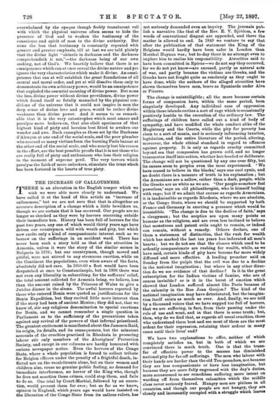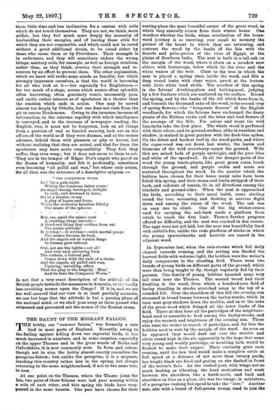THE INCREASE OF CALLOUSNESS.
THERE is an alteration in the English temper which we wish we were able more clearly to understand. We have called it at the head of this article an "increase of callousness," but we are not sure that that is altogether an accurate description of a change which a little bewilders us, though we are certain that it has occurred. Our people are no longer so shocked as they were by horrors occurring outside their immediate ken. History has been full of horrors for the past two years, any one of which would thirty years ago have driven our countrymen wild with wrath and pity, but which now excite only a kind of compassionate interest such as we bestow on the sufferings in an accident ward. There has never been such a story told as that of the atrocities in Armenia, unless it were the story of the similar scenes in Bulgaria in 1876; but our countrymen, though moved and pitiful, were not stirred to any strenuous exertion, while on the Continent the populations, even when aware of the facts, absolutely did not care. In 1850-GO a fleet would have been despatched at once to Constantinople, but in 1896 there was not even any liberality in subscribing for the sufferers' relief, the total amount collected for Armenia being, we believe, less than the amount raised by the Princess of Wales to give a Jubilee dinner in the slums. The awful horrors reported by those who entered Benin were quoted as justifications for the Benin Expedition, but they excited little more interest than if the story had been of ancient Mexico ; they did not, that we know of, stir any religions denomination to special exertions for Benin, and we cannot remember a single question in Parliament as to the sufficiency of the precautions taken against any revival of the powers of that infernal priesthood. The greatest excitement is manifested about the Jameson Raid, its origin, its details, and its consequences, but the minutest accounts of the cruelties practised in Rhodesia in procuring labour stir only members of the Aborigines' Protection Society, and except in our columns are hardly honoured with serious newspaper notice. Even the horrors of the Congo State, where a whole population is forced to collect tribute for Belgian officers under the penalty of a frightful death, in- flicted not on the recalcitrants alone, but on their women and children also, rouse no genuine public feeling, no demand for immediate interference, no horror of the King who, though he does not sanction these crimes, could stop them, and fails to do so. One trial by Court-Martial, followed by an execu- tion, would prevent them for ever; but so far as we know, opinion in England, which years ago would have insisted on the liberation of the Congo State from its canons rulers, has
not seriously demanded even an inquiry. The journals pub- lish a narrative like that of the Rev. E. V. Sjoblom, a few words of conventional disgust are appended, and there the matter is allowed to end. In 1849 we venture to say that after the publication of that statement the King of the Belgians would hardly have been safer in London than Marshal Haynau. was ; but to-day there is no attempt even to implore him to realise his responsibility. Atrocities said to have been committed in Epirus—we do not say they occurred, for we do not yet know—are excused, partly as natural acts of war, and partly because the victims are Greeks, and the Greeks have not fought quite as resolutely as they ought to have done, while the authors of the alleged atrocities have shown themselves brave men, brave as Spaniards under Alva or Pizarro.
The change is unintelligible ; all the more because certain forms of compassion have, within the same period, been singularly developed. Any individual case of oppression within these islands excites a sort of rage which is occasionally positively hostile to the execution of the ordinary law. The sufferings of children have called out a kind of body of sympathy, and have modified the whole conduct alike of the Magistracy and the Courts, while the pity for poverty has risen to a sort of mania, and is seriously influencing taxation, legislation, and the entire literature of the period, altering, moreover, the whole ethical standard in regard to offences against property. It is only as regards cruelty committed beyond sea that compassion has grown cold, and no longer transmutes itself into action, whether hot-headed or deliberate. The change will not be questioned by any one over fifty, but its causes seem to perplex even the most experienced. We have ceased to believe in the blacks,' says one cool cynic, and no doubt there is a measure of truth in his explanation ; but the Armenians are a sallow, rather than a dark, people, while the Greeks are as white as we are. Our people somehow feel powerless,' says an old philanthropist, who is himself boiling with rage; but if we admit that excuse as regards Armenians, it is inadmissible as regards Rhodesia, where we are absolute, or the Congo State, where we should be supported by both France and Germany in exerting a pressure which would be irresistible. The change is due to the decline of faith,' says a clergyman ; but the sceptics are upon many points as humane as the religions, and are even less inclined to believe that monstrous and patent evils ought to remain, or indeed can remain, without a remedy. Others declare, one of them a statesman of distinction, that the rush for wealth which has marked the last ten years has indurated all men's hearts ; but we do not see that the classes which used to be ardently compassionate are rushing for wealth, while, as we have said, certain kinds of pity have become far more widely diffused and more effective. A leading preacher said on Sunday from the pulpit that the evil was due to a decline in the national imagination ; but where in any other direc- tion do we see evidence of that decline P Is it in the great subscription for the Indian victims of famine, who are of course invisible P or is it in the burst of emotion which showed that London suffered almost like Paris because of the calamity in the Rue Jean Goujon P The kind of the national imagination may have deteriorated, but the imagina- tion itself exists as much as ever. And, finally, we are told by a thousand voices that we have supped too full of horrors, that we are suffering, in fact, from their passing under the rule of use and wont, and in that there is some truth ; but, then, why do we find that, as regards all usual cruelties, those who understand them best and see most of them are the most ardent for their repression, retaining their ardour in many cases until their lives' end?
We have two explanations to offer, neither of which completely satisfies us, but in both of which we are convinced there is much truth. One is that the trans- fer of effective power to the masses has diminished national pity for far-off sufferings. The men who labour with their hands are harder than the old Ten-pounders, not because they are less compassionate or have less imagination, but because they are more fully engrossed with the day's duties, more accustomed to see remediless suffering. more intent on warding off from themselves calamities which the middle class never seriously feared. Hungry men are pitiless in all countries, and though our people are not hungry, they are closely and incessantly occupied with a struggle which leaves
them little time and less inclination for a contest with evils -which do not touch themselves. They are not, we think, more selfish, but they feel much more deeply the necessity of husbanding their energies, and of leaving those evils for which they are not responsible, and which could not be cared without a great additional strain, to be cured either by those who cause them or by Providence. Their strength is in endurance, and they will sometimes endure the wrong things, sanitary evils, for example, as well as foreign cruelties, rather than, as they think, overtax their strength and re- sources by an effort to prevent them. The other explanation, which we know will strike some minds as fanciful, but which strongly impresses ourselves, is that the world is becoming for all who look at it—but especially for Englishmen— far too much of a stage, across which scenes often splendid, often harrowing, often genuinely comic, incessantly pass, and excite rather interest as of spectators in a theatre than the emotion which ends in action. One may be moved almost too deeply by Othello, but one does not rush from the pit to rescue Desdemona. Owing to the immense increase of information, to the extreme rapidity with which intelligence is conveyed, and to the increase of newspaper reading, the English, who, it must not be forgotten, look on all things from a position of real or fancied security, look out on the affairs of the world as if they were dramas, and as the scenes -advance, behold them with pleasure or pity or horror, but without realising that they are actual, and that for them the spectators may have acute responsibility. They feel, they suffer, they even weep ; but it does not occur to them to act. They are in the temper of Edgar Poe's angels who gazed on the drama of humanity, and felt it profoundly, sometimes even becoming " all pallid and wan," but whose only action, for all that, was the utterance of a descriptive epigram :—
" THE CONQUEROR WORM.
Lo ! 'tis a gala night Within the lonesome latter years ! An angel throng, bewinged, bedight In veils, and drowned in tears, Sit in a theatre, to see A play of hopes and fears, 'While the orchestra breathes fitfully The music of the spheres.
- ..... • But, see, amid the mimic rout
A crawling shape intrude—
A blood-red thing that writhes from out The scenic solitude!
It writhes !—It writhes !—with mortal pangs
The mimes become its food, And the angels sob at vermin fangs In human gore imbued.
Out, out are the lights—out all! And over each quivering form The curtain, a funeral pall, Comes down with the rush of a storm. And the angels, all pallid and wan, Uprising, unveiling, affirm That the play is the tragedy, Man,' And its hero the Conqueror Worm."
Is not that a very exact description of the attitudc• of the British people towards the massacres in Armenia, or the hardly less revolting scenes upon the Congo ? If it is, and we are too well assured that our view is at least partially accurate, we can but hope that the attitude is but a passing phase of the national mind, or we shall pass away as those passed who witnessed and prevented not the scenes of the Roman arena.







































 Previous page
Previous page